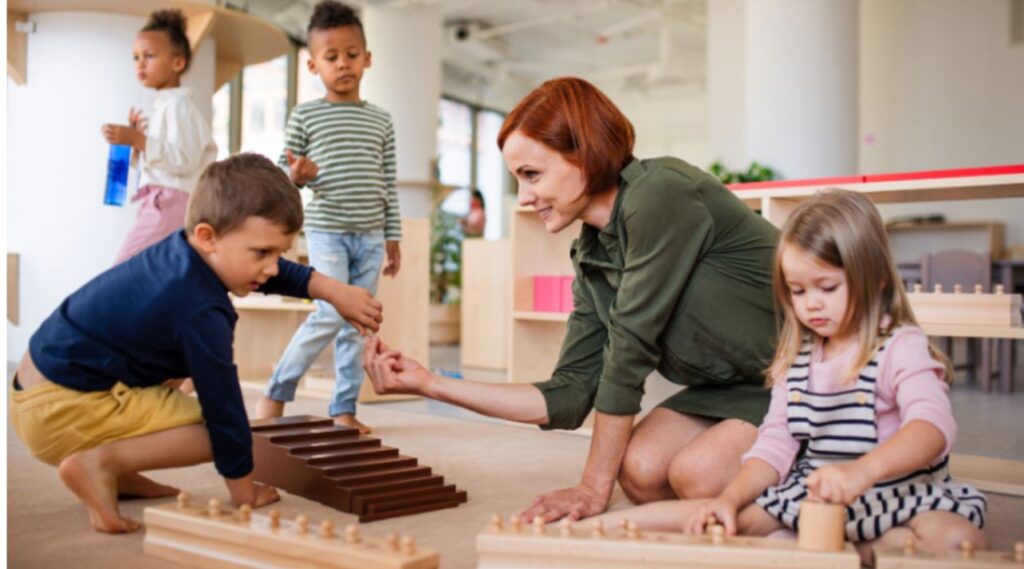Montessori education is a unique approach that focuses on a child’s natural curiosity and desire to learn. Unlike traditional education, it emphasizes hands-on learning and developing real-world skills. The Montessori method encourages children to explore their interests in a carefully prepared environment, fostering independence and self-motivation.
In Montessori classrooms, children are provided with specialized learning materials that help them grow in all aspects—physical, social, emotional, and cognitive. This holistic development is key to nurturing a well-rounded individual. Montessori educators view children as capable and eager learners, guiding them to initiate and pursue knowledge on their own.
Interested in learning more about how Montessori education can benefit your child? Explore the First Academy Montessori for more insights into this innovative educational philosophy.
Understanding Montessori Education
Montessori education focuses on student-led, self-paced learning.
Children in a Montessori classroom work on activities they choose. Teachers guide and assess, but children have the freedom to explore.
The classroom environment is specially prepared. Montessori classrooms often have multi-age groups. This setup promotes independence, citizenship, and accountability.
Here are some key components of Montessori education:
- Self-Directed Learning: Children choose activities to work on, driven by their own interests.
- Prepared Environment: Classrooms are designed to encourage independence and exploration.
- Mixed-Age Classrooms: Older children mentor younger ones, fostering a sense of community.
Teachers play an important role in a Montessori classroom. They observe and guide rather than direct. This helps children develop personal responsibility and a love for learning.
Montessori materials are unique and hands-on. These materials help children grasp abstract concepts by using concrete objects. Examples include beads for math and sandpaper letters for writing.
Benefits of Montessori education
- Fosters independence and self-motivation
- Encourages a lifelong love of learning
- Helps develop social and emotional skills
Montessori education can be applied from infancy through high school. The method adapts to the developmental stages of each child.
Developmental Benefits of Montessori Education
Montessori education offers many developmental benefits, aiding growth in various aspects.
Independence and Responsibility
Montessori schools focus on developing independence in children. Students choose their activities and learn at their own pace, fostering responsibility. The multi-age classroom setting helps kids take on roles and responsibilities naturally.
Social and Emotional Growth
Montessori methods encourage empathy and cooperation. Activities often involve group work, teaching children to respect others and work well in teams. This nurturing environment helps students build strong social skills.
Academic Skills Enhancement
Research shows that Montessori education benefits academic skills, especially in language and math. The hands-on learning approach allows children to understand concepts deeply, helping them excel academically.
Creativity and Problem-Solving
Montessori classrooms enhance creativity and problem-solving abilities. Students are given the freedom to explore materials and ideas, which supports innovative thinking. This approach encourages a lifelong love for learning.
Physical Development
Montessori activities also support physical development. Fine motor skills are improved through activities like writing and drawing. Practical life exercises, such as pouring and buttoning, enhance coordination and dexterity.
Self-Motivation and Confidence
Children in Montessori settings develop self-motivation and confidence. They are encouraged to set their own goals and challenges, boosting their self-esteem. This self-directed learning helps them become confident, resilient learners.

Choosing the Right Montessori School for Your Child
Selecting a Montessori school involves careful consideration. It’s important to visit multiple schools. Observe classrooms to see if the environment feels welcoming and engaging.
Key factors to consider:
- Teachers: Look for trained Montessori educators. Their expertise is crucial for a genuine Montessori experience.
- Classroom Environment: Classrooms should be orderly with accessible materials. Look for varied activities that promote independence.
Questions to ask during visits:
- How are teachers trained?
- What is the student-to-teacher ratio?
- How is progress assessed?
Parent Involvement:
Montessori schools often encourage parent participation. Check if the school includes parents in activities and decision-making.
Community and Culture:
A supportive school community can enhance your child’s experience. Talk to other parents to understand the school culture.
Extra-curricular Activities:
Ask about available activities outside the standard curriculum. These can provide a well-rounded education.
Location and Cost:
Consider practical aspects like the school’s location and fees. Make sure it fits your family’s needs without causing strain.
Choosing the right Montessori school requires research and personal visits. Take your time to find the best fit for your child’s learning and growth.
Why Montessori Education Might Be Right for Your Child
Montessori education focuses on individually paced learning. Each child chooses tasks that match their interests and developmental stage. This personalized approach can boost self-esteem and motivation.
Fostering Independence
Children have the freedom to make choices in their learning. They learn to manage tasks without constant teacher interventions. This helps them become independent and confident.
Mixed-Age Classrooms
Montessori classrooms often have children of different ages. Older students can help younger ones, reinforcing their knowledge while learning leadership skills. Younger children get inspired by older peers.
Long Learning Blocks
Students get long, uninterrupted periods to work on activities. These blocks, sometimes lasting up to three hours, help children immerse themselves in their tasks deeply.
Focus on Hands-On Learning
Montessori emphasizes learning through experience. Instead of listening to lectures, children use materials to explore and understand concepts. This hands-on approach can make learning more engaging and effective.
Encouraging Empathy and Social Skills
Montessori education often includes activities that teach children about empathy and social justice. This can help them develop strong interpersonal skills and a sense of compassion for others.
No Grades or Homework
Instead of traditional grades, Montessori focuses on self-assessment and teacher observations. Children do not have homework, allowing them to relax and pursue interests outside school.
Promotes Lifelong Learning
By allowing children to follow their interests and encouraging a love of learning, Montessori helps foster curiosity and a passion for knowledge that can last a lifetime.
Frequently Asked Questions
Montessori education offers various benefits and differs from traditional schooling in many ways. It uses unique materials and methods guided by foundational principles.
What are the core benefits of a Montessori education system?
Montessori education fosters independence and critical thinking. Children learn at their own pace and explore subjects deeply. This can lead to a lifelong love of learning and strong problem-solving skills.
How does the Montessori curriculum differ from a traditional curriculum?
In Montessori schools, the curriculum is child-centered and adaptive. Unlike traditional systems that follow a strict schedule, Montessori classrooms allow students to choose their activities based on their interests. There is a strong focus on practical life skills, hands-on learning, and sensory experiences.
Can you describe the Montessori method of teaching and the materials used?
Montessori teaching emphasizes learning through experience. Teachers guide rather than instruct, focusing on individual student needs. Materials include multi-sensory tools like movable alphabets, counting beads, and practical life items. These tools encourage self-directed learning and help children understand abstract concepts through tangible objects.
What are the foundational principles that guide the Montessori educational approach?
The Montessori approach is based on respect for the child, the importance of a prepared environment, and the role of the teacher as a guide. It believes in fostering natural curiosity and allowing children to discover and learn at their own pace. Key principles include observation, individual learning plans, and mixed-age classrooms.
What are the advantages and disadvantages of Montessori schools?
The advantages of Montessori education include personalized learning, the development of independence, and strong academic and social skills. Disadvantages might be the cost of tuition and the potential lack of structure for some children who may thrive in more traditional settings. Adaptation from Montessori to traditional schools can also be challenging for some students.
How does a Montessori high school’s approach to education vary from other high school models?
Montessori high schools continue the focus on self-directed learning and real-world applications. They emphasize project-based learning, community involvement, and internships. This differs from the more rigid, exam-focused approach of traditional high schools. Students are encouraged to pursue their passions and develop practical skills for their future careers.







